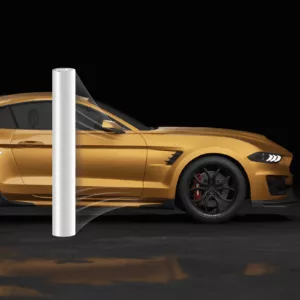Can You Modify a Leased Car? Understanding Tinting and Customization Rules with TERMINAX
Can You Modify a Leased Car? Unraveling the Rules and Options
If you’re a car lessee with an itch to customize your vehicle, you’ve probably asked yourself, “Can you modify a leased car?” The allure of adding a personal touch, whether through aesthetic changes or functional upgrades, is strong. However, leasing a car comes with its own set of rules and restrictions. In this blog, we’ll explore the ins and outs of modifying leased cars, with a particular focus on whether auto tinting is allowed, and how TERMINAX, a leading brand in high-performance automotive films, fits into the equation.

The General Rules of Modifying Leased Cars
Leasing a car means you’re essentially renting it for a specific period, and during this time, the vehicle still belongs to the leasing company. As such, most lease agreements come with strict guidelines regarding modifications. The primary goal of these rules is to ensure the vehicle maintains its value and remains in a condition that can be easily leased or sold again in the future.
Typically, major structural or mechanical modifications are almost always prohibited. This includes altering the engine, suspension, or transmission systems. Such changes can affect the vehicle’s performance, reliability, and safety, and they often void the manufacturer’s warranty. Even minor aesthetic changes, like adding body kits or changing the wheels, may require prior approval from the leasing company.
Auto Tinting and Leased Cars
When it comes to auto tinting, the situation is a bit more nuanced. While some lease agreements may have an outright ban on tinting, others may allow it under certain conditions. The key factor often revolves around compliance with local laws and the potential for damage to the vehicle’s windows.
Local Tint Laws Matter
Just like with privately owned cars, leased vehicles must adhere to local tinting regulations. If you install a tint that violates the legal visible light transmission (VLT) percentages in your area, it’s not only illegal but can also cause issues with your lease agreement. For example, if your lease contract states that you’re responsible for any legal violations related to the vehicle, you could face fines or additional charges from the leasing company.
Damage-Free Installation is Key
Another concern for leasing companies is the potential for damage during the tint installation process. Poorly installed tint can lead to scratches on the windows, air bubbles, or adhesive residue that’s difficult to remove. If the tinting job causes any damage to the vehicle, you’ll likely be held responsible for the repair costs when you return the car at the end of the lease.
TERMINAX: A Lessee – Friendly Option for Auto Tinting
TERMINAX offers a solution for lessees who want to tint their leased cars while staying within the bounds of their lease agreements and the law. Their high-quality automotive tint films are designed with precision and advanced technology, ensuring a professional-looking and damage-free installation.
Legal Compliance
TERMINAX provides a wide range of tint options with different VLT percentages, making it easy for lessees to choose a product that meets local tinting laws. Whether you need a lighter tint to comply with strict regulations or a darker, more stylish option that’s still legal, TERMINAX has you covered. By using TERMINAX tint, you can avoid legal issues related to improper tinting, which could otherwise get you in trouble with both the law and your leasing company.
Quality and Durability
The brand’s innovative coating technologies and proprietary coloring techniques not only offer excellent UV protection and heat reduction but also ensure the tint film lasts throughout the lease period without peeling, cracking, or fading. TERMINAX’s lotus-inspired, self-cleaning surface further reduces the risk of damage from dirt and grime, keeping the windows looking great and minimizing the chances of any issues when it’s time to return the vehicle.
Ease of Removal
One of the biggest advantages for lessees is that TERMINAX tint films can be removed cleanly and easily at the end of the lease. Their films are designed in such a way that they don’t leave behind stubborn adhesive residue or cause damage to the windows during removal. This means you can enjoy the benefits of tinted windows during your lease and restore the vehicle to its original condition without hassle.
Tips for Modifying a Leased Car
- Read Your Lease Agreement Thoroughly: Before making any modifications, carefully review your lease contract to understand exactly what’s allowed and what’s prohibited. Pay close attention to the sections regarding vehicle condition and alterations.
- Get Prior Approval: If you’re considering a modification, such as auto tinting, contact your leasing company and ask for permission. Some companies may be more lenient than others, and getting written approval can save you from potential problems down the line.
- Choose Quality Products and Professional Installers: Whether it’s tinting or another type of modification, using high-quality products like TERMINAX and having them installed by professionals can minimize the risk of damage and ensure the work meets the leasing company’s standards.
Conclusion
Modifying a leased car is possible, but it requires careful consideration of your lease agreement, local laws, and the quality of the modifications. When it comes to auto tinting, TERMINAX offers a reliable, stylish, and lessee-friendly option that allows you to enhance your vehicle’s appearance and functionality while staying on the right side of the rules.
By following the tips outlined in this blog and choosing the right products, you can enjoy a customized leased car without the worry of violating your lease terms.


